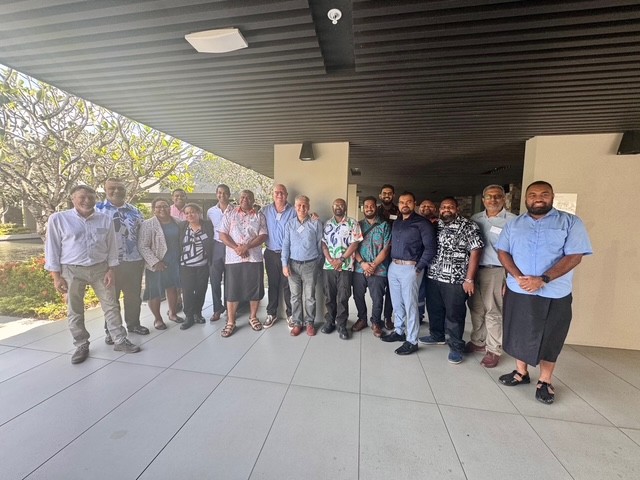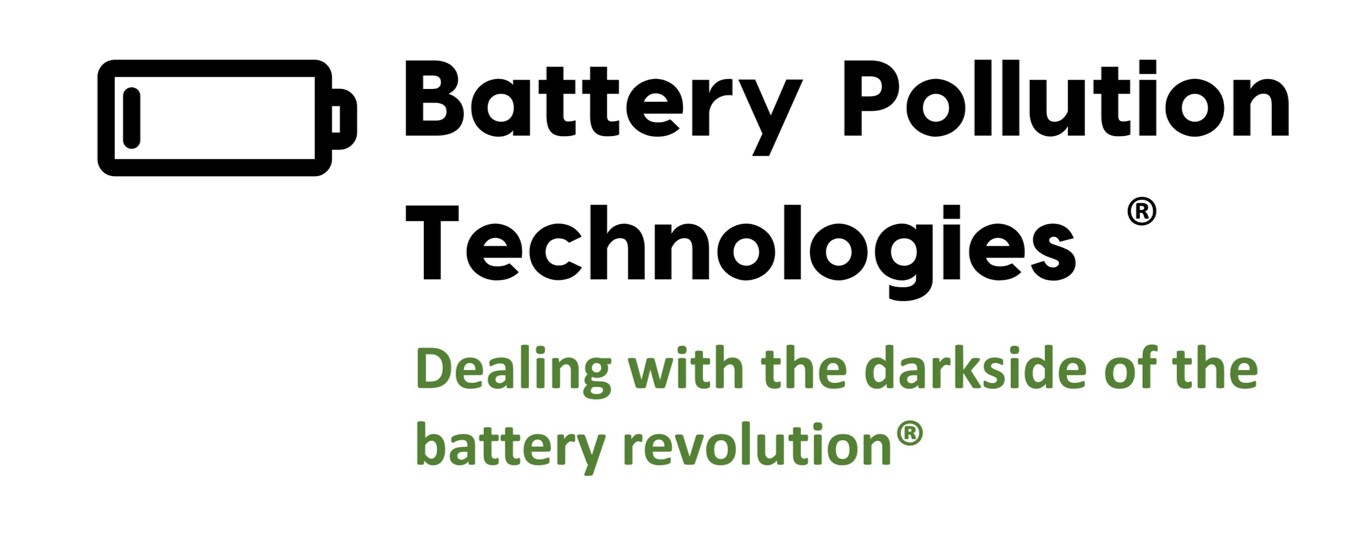Trending...
- Crowdfunding Campaign Tips Off for 'NAWFSIDE' Short Film Highlighting Pressure in Youth Sports
- 'Wild Hermit Wellness' Has Achieved Bestseller Status in Just 2 Months Since Launch Of Organic Skincare Line
- Words of Veterans & Veterans Growing America Collaboration
This partnership will support a series of coordinated initiatives including joint research into battery end-of-life issues in tropical climates and feasibility studies for establishing a battery recycling regional hub facility in Fiji to support all Pacific Nations in a "hub and spoke" operational framework.
SYDNEY & SUVA, Fiji - PrAtlas -- The University of the South Pacific (USP) and Australian start-up Battery Pollution Technologies (BPT) are pleased to announce an exclusive strategic collaboration aimed at addressing battery pollution, circular economy opportunities, and sustainable energy challenges in the Pacific Islands region.
This partnership will support a series of coordinated initiatives including joint research into battery end-of-life (EoL) issues in tropical climates and feasibility studies for establishing a battery recycling regional hub styled facility in Fiji.
It also includes the evaluation of second-life battery applications to extend the usable life of lithium-based energy systems.
The partnership follows on from the First Pacific Battery Briefing that was delivered by Sydney-based Battery Pollution Technologies to various Fijian Government Agencies in May 2025.
With battery usage surging across the Pacific – driven by electrification, renewable energy storage, and mobility – the environmental and logistical challenges of safe disposal and reuse are growing. The partnership seeks to generate practical, regionally adapted solutions that prioritise environmental integrity, economic development, commercial opportunity and energy resilience.
More on PrAtlas
Pacific Island countries face an urgent challenge in managing battery waste, driven by their geographic isolation, limited waste management infrastructure, and the vulnerability of their land and marine ecosystems.
Batteries power everything from mobile phones and solar lanterns in remote communities to electric vehicles and backup systems for island energy grids.
However, the presence of hazardous materials such as lithium, cobalt, and nickel poses significant environmental and safety risks if not properly managed.
Improper disposal can contaminate drinking water, damage coral reefs, and heighten ire hazards – especially in densely populated areas or during extreme weather events like cyclones.
As small island developing states, Pacific nations require practical, circular economy solutions that reduce dependency on imports, build local capabilities, and safeguard both the environment and cultural heritage.
For Fijian and Pacific communities, this is highly relevant as the use of batteries grows every year – from mobile phones & e-mobility scooters and bikes to the growing number of electric and hybrid vehicles.
Lithium batteries pose a unique challenge in end-of-life disposal due to their potential to catch ire, the presence of hazardous materials and the complexity of safely recycling and reusing valuable battery metals such as lithium, cobalt, copper and nickel.
"This partnership is a significant step forward in realising a circular battery economy for the Pacific," said Mansour Assaf, an Associate Professor at USP's School of Information Technology, Engineering, Mathematics and Physics (STEMP).
More on PrAtlas
"By combining BPT's technical & commercial experience with USP's regional insight and research capabilities, we aim to build sustainable models that can be scaled across all island nations."
"This is more than a research initiative," added Nicholas Assef, Founder & Managing Director of Battery Pollution Technologies.
"It's a commitment to innovation that delivers real environmental outcomes, the potential for investment, fit-for-purpose technology development and local education and employment opportunities."
"The Pacific is one of Earth's most beautiful regions, and the environmental impact of toxic end-of-life batteries in land and water needs to stop." Nicholas Assef concluded.
The collaboration will also encompass student research opportunities, policy engagement with Pacific regional governments and battery recycling capacity-building programmes across Pacific Island countries.
A critical and time-sensitive initiative will be the rapid establishment of structured internships at The University of the South Pacific, aimed at equipping students with hands-on experience in the fast-evolving battery ecosystem.
These internships will urgently address vital areas – battery diagnostics, second-life potential, materials recovery, data systems, and safe end-of-life disposal – accelerating the development of Fijian and Pacific Nations talent needed now to drive renewable energy efforts and circular economy outcomes across the region.
Battery Pollution Technologies and The University of the South Pacific have spent the past two years working closely to bring this initiative to life.
With momentum building, both parties are now eager to accelerate progress and deliver meaningful outcomes through this vital Trans-Pacific collaboration.
This partnership will support a series of coordinated initiatives including joint research into battery end-of-life (EoL) issues in tropical climates and feasibility studies for establishing a battery recycling regional hub styled facility in Fiji.
It also includes the evaluation of second-life battery applications to extend the usable life of lithium-based energy systems.
The partnership follows on from the First Pacific Battery Briefing that was delivered by Sydney-based Battery Pollution Technologies to various Fijian Government Agencies in May 2025.
With battery usage surging across the Pacific – driven by electrification, renewable energy storage, and mobility – the environmental and logistical challenges of safe disposal and reuse are growing. The partnership seeks to generate practical, regionally adapted solutions that prioritise environmental integrity, economic development, commercial opportunity and energy resilience.
More on PrAtlas
- Pastor Darrell Armstrong Suspends Gubernatorial Campaign And Endorses Mikie Sherrill
- Dr. Johnny Shanks Attends Full Arch Growth Conference 2025
- Offline Asset Protection: NJTRX Implements 98 Percent Cold Storage as Industry Faces 2 Billion USD Losses
- Thousands of Smiles, Millions of Logo Views: RoarFun Brings Emotions Into Premium Retail Spaces with Formula Simulator for Immersive Brand Activation
- Qvarz LLC Expands Global Reach with High-Precision Quartz Cuvettes and Optical Components
Pacific Island countries face an urgent challenge in managing battery waste, driven by their geographic isolation, limited waste management infrastructure, and the vulnerability of their land and marine ecosystems.
Batteries power everything from mobile phones and solar lanterns in remote communities to electric vehicles and backup systems for island energy grids.
However, the presence of hazardous materials such as lithium, cobalt, and nickel poses significant environmental and safety risks if not properly managed.
Improper disposal can contaminate drinking water, damage coral reefs, and heighten ire hazards – especially in densely populated areas or during extreme weather events like cyclones.
As small island developing states, Pacific nations require practical, circular economy solutions that reduce dependency on imports, build local capabilities, and safeguard both the environment and cultural heritage.
For Fijian and Pacific communities, this is highly relevant as the use of batteries grows every year – from mobile phones & e-mobility scooters and bikes to the growing number of electric and hybrid vehicles.
Lithium batteries pose a unique challenge in end-of-life disposal due to their potential to catch ire, the presence of hazardous materials and the complexity of safely recycling and reusing valuable battery metals such as lithium, cobalt, copper and nickel.
"This partnership is a significant step forward in realising a circular battery economy for the Pacific," said Mansour Assaf, an Associate Professor at USP's School of Information Technology, Engineering, Mathematics and Physics (STEMP).
More on PrAtlas
- $300 Million Web3 Initiative and ZIGChain Partnership Power $20 Target in Noble Capital Markets Report for SEGG Media (N A S D A Q: SEGG)
- Assent Recognizes Manufacturers for Leading Supply Chain Sustainability Programs
- Arc Longevity Sells Out Debut Women's Creatine Gummy
- New Research Reveals Mild Cold—Not Extreme Cold—Delivers Real Health Benefits of Cold Therapy
- Phinge, Home of Netverse, Through its Extensive Software & Hardware Patent Portfolio, Shows Founder & CEO Robert DeMaio's Vision & Innovation
"By combining BPT's technical & commercial experience with USP's regional insight and research capabilities, we aim to build sustainable models that can be scaled across all island nations."
"This is more than a research initiative," added Nicholas Assef, Founder & Managing Director of Battery Pollution Technologies.
"It's a commitment to innovation that delivers real environmental outcomes, the potential for investment, fit-for-purpose technology development and local education and employment opportunities."
"The Pacific is one of Earth's most beautiful regions, and the environmental impact of toxic end-of-life batteries in land and water needs to stop." Nicholas Assef concluded.
The collaboration will also encompass student research opportunities, policy engagement with Pacific regional governments and battery recycling capacity-building programmes across Pacific Island countries.
A critical and time-sensitive initiative will be the rapid establishment of structured internships at The University of the South Pacific, aimed at equipping students with hands-on experience in the fast-evolving battery ecosystem.
These internships will urgently address vital areas – battery diagnostics, second-life potential, materials recovery, data systems, and safe end-of-life disposal – accelerating the development of Fijian and Pacific Nations talent needed now to drive renewable energy efforts and circular economy outcomes across the region.
Battery Pollution Technologies and The University of the South Pacific have spent the past two years working closely to bring this initiative to life.
With momentum building, both parties are now eager to accelerate progress and deliver meaningful outcomes through this vital Trans-Pacific collaboration.
Source: Battery Pollution Technologies
0 Comments
Latest on PrAtlas
- He Started a New Career at 77; Maybe Not His Last
- "The Art of Philanthropy" — A Year-Long Campaign Supporting the USO and Military Veterans
- TRUE Palliative Care Launches as California Strengthens Commitment to Compassionate Care Under SB 403
- Mysterious Interstellar Object 3I/ATLAS Appears to Pause Near Mars, Exhibiting Periodic Light Pulses
- $73.6 Million in Order Backlog Poised for Explosive Growth in 2026; Streamlined Share Structure: Cycurion, Inc. (N A S D A Q: CYCU) $CYCU
- Osric Langevin Unveils "Quantitative Trend" Framework for Multi-Asset Analysis in Q4 2025
- Experience Days Named Among the UK's Top Christmas Gifts
- New Free Educational Bingo Cards Make Learning English Fun for First Graders
- Wzzph Provides Stablecoin Trading Solutions for Latin American Traders Amid Digital Currency Policy Adjustments
- NaturismRE Calls for Recognition of AI as Sentient Kin in Global Bill of Rights
- PDS Plumbing & Air Honors Veterans with "Free Tune-Up & A Turkey" Giveaway
- AgeImmune Announces the Launch of ImmuneG.I. — A Doctor-Formulated Herbal Supplement Supporting Gut and Digestive Wellness
- Precision Adult Care Unveils Essential Guidelines for Choosing a Senior Home Care Company
- Postmortem Pathology Delivers Expert Private Autopsy Services with Compassion and Precision
- Colorado Families Turn to Private Autopsies for Peace of Mind
- $5.4 Million Growth Acceleration, Fleet Expansion and $1.485 Million Strategic Financing: Multi Ways Holdings (N Y S E: MWG) $MWG
- Delta Capital Group Expands Business Funding Terms Up to 24 Months
- Hip-HopVibe.com Launches HHV Media Network in Partnership with The Publisher Desk
- CCHR: Misinformation Clouds Debate on Psychiatric Drug Toxicology Transparency
- Hilton Head Realtor becomes Certified Senior Professional

